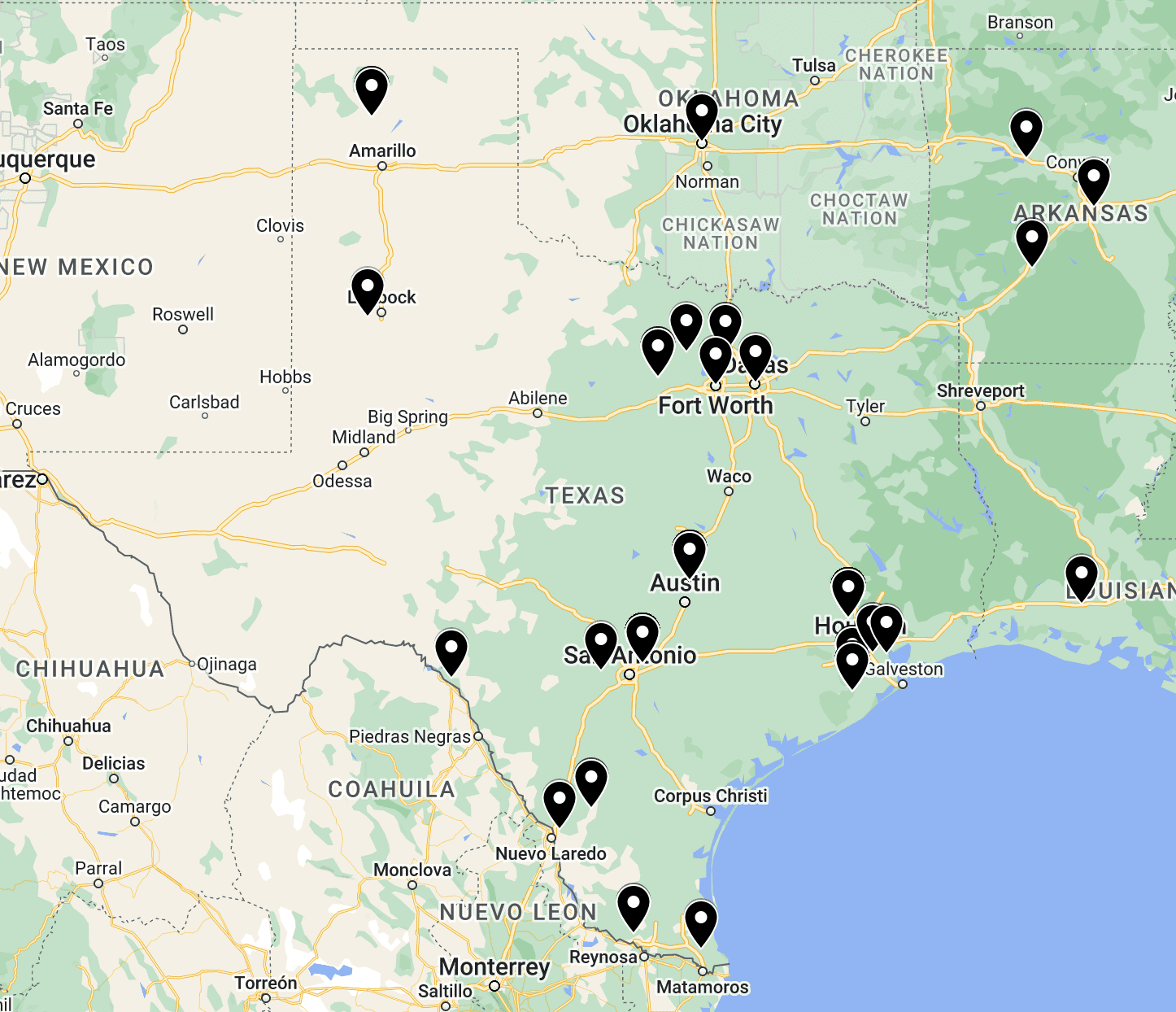Mirroring the flow of illegal immigrants crossing America’s porous southern border, Chinese Communist Party (CCP) investment in American social and political structures continues.
Texas Scorecard previously reported on the CCP’s intrusions into Texas education, society, and politics. Another area in which their advances have gone somewhat unabated is the industrial sector, and these advances go even further than was previously thought. The CCP’s focus on Texas commerce and land is yet another avenue for its multifaceted influence operation across the globe.
According to a report by the Foundation for the Defense of Democracies, “The CCP positions to leverage industrial dependencies in order to shape the actions of international financial and commercial players—and in doing so to affect national and subnational government policy.” A Reuters report showed a prime example, where the Chinese Embassy warned various American industries to oppose bills that hampered trade benefiting China: “We sincerely hope you … will play a positive role in urging members of Congress to abandon the zero-sum mindset and ideological prejudice, stop touting negative China-related bills, delete negative provisions, so as to create favorable conditions for bilateral economic and trade cooperation before it is too late…”
Key players in the CCP’s agenda are individual Chinese businesses. Unlike the private-public distinction present in the United States, there is no clear break between the state and private businesses in the communist country, especially when it comes to foreign dealings. Industrial progress plays an important role in the CCP’s agenda, such as the Belt and Road Initiative and the Made in 2025 Plan. Both of these are initiatives by which the CCP seeks to “[sharpen] China’s economic and technological competitive edge on the global stage.”
Houston, Texas plays a special role in this industrial advancement. According to a report by the Greater Houston Partnership, “China is Houston’s second largest international trading partner.” There are 22 subsidiaries of Chinese companies located in the Houston area. Total Houston-China trade as of 2022 reached $31.9 billion.
The Greater Houston Partnership (GHP) is an advocate for these continued relations.
When the Chinese consulate in Houston was shuttered in 2020, Bob Harvey, President of GHP, lamented the closure: “We regret to see the closure of the consulate of the People’s Republic of China in Houston….We are aware of U.S. officials’ concerns directed at Chinese officials and Chinese nationals regarding the theft of intellectual property and cyber theft in the United States and hope that China will take immediate steps to address these concerns. We look forward to the reopening of the consulate in Houston once these concerns are addressed.”
It should be noted that the Presidents of some of the most well-known universities in Texas sit on the GHP Board of Directors, including Kathy Banks, former President of Texas A&M University. Banks recently resigned after the attempted hiring of a journalism director who was an avid supporter of DEI measures. Banks’ interim replacement is Mark Welsh III, retired Air Force General and former dean of Texas A&M’s Bush School of Government. Welsh was also an Obama appointee to the Joint Chiefs of Staff. In 2013, Welsh traveled to Communist China and met with the air force general of the Chinese military. The following year, Welsh co-wrote a paper on “Strengthening Understanding and Engagement with China’s Air Force.”
Other members of the Board of Directors include Reginald DesRoches, President of Rice University; Renu Khator, President of the University of Houston; Austin A. Lane, former President of Texas Southern University; Robert Sloan, President of Houston Christian University; Ruth Simmons, former President of Prairie View A&M University; Cesar Maldonado, former Chancellor of Houston Community College; and LaTonya Goffney, Superintendent of Aldine ISD. Rod Paige, former Secretary of Education under President George W. Bush, serves as an Honorary Board Member.
One of the primary targets of CCP investment in the Lone Star State is land.
CCP Bait and Switch
China’s focus on U.S. land has not lessened, and efforts by state lawmakers to prevent CCP actors from buying up Texas land have yet to prove completely successful. According to a USDA spokesperson, “Chinese investors (to include individual foreign investors, Chinese entities not created in the U.S., and U.S. corporations with Chinese shareholders) have reported ownership of approximately 384,000 acres of agricultural land in the United States.”
In 2022, Texas Scorecard reviewed the widely reported the activities of Chinese billionaire Sun Guangxin, whose companies bought up hundreds of thousands of acres in Val Verde, TX in 2015. As a member of the Chinese military (ironically dubbed the People’s Liberation Army), Guangxin has concerning ties to the CCP. Guangxin’s companies planned to start Blue Hills Wind Farm on a portion of the land not far from an American Air Force base.

Guangxin purchased the aforementioned thousands of acres through two of his companies: Harvest Texas LLC and Brazos Highland Properties.
According to data recorded by the U.S. Department of Agriculture (USDA), under the Agricultural Foreign Investment Disclosure Act (AFIDA), Brazos Highland Properties purchased 26,672 acres of land in Val Verde County in 2018 for $24.6 million. The following year, Harvest Texas LLC purchased over 29,000 acres of land for $41.5 million. These records are not exhaustive, since the USDA began providing these records to the public in June 2023, but they give the public a small glimpse of foreign holdings of U.S. land. In 2019, one of the lobbyists on behalf of Brazos Highland Properties was Drew DeBerry, former Director of Budget and Policy for Texas Governor Greg Abbott (R).
Abbott’s office did not respond to a request for comment about this before publication.
These acquisitions drew shock and concern among lawmakers and citizens in 2019. It prompted the passage of the Lone Star Infrastructure Protection Act in 2021, prohibiting foreign companies or citizens from countries like China from purchasing land near critical infrastructure, like military bases.
However, weak spots in the law soon became apparent. A proposed law in the 2023 legislative session, Senate Bill 147, would have prohibited foreign citizens and companies from China, North Korea, Russia, and Iran from buying land in Texas, regardless of location. Introduced by State Sen. Lois Kolkhorst (R–Brenham), her proposed law was killed by the Republican-controlled Texas House.
“SB 147 built on SB 2116 by prohibiting these foreign nationals named in the Annual Threat Assessment from purchasing land in our state, as a matter of national security. Another important tool within SB 147 was the investigatory powers given to the Attorney General to determine who truly controlled the land,” Kolkhorst said in response to an inquiry by Texas Scorecard. “While the Texas Senate passed SB 147 with support of Senators from both parties, it unfortunately was not given a hearing in the House. Until we can take action again during the next regular session, I am hopeful Governor Abbott will consider this issue for the call of a special session.”
Despite this failure, the former piece of legislation did prove somewhat effective. Shortly after the Lone Star Infrastructure Protection Act went into effect, Guangxin’s company sold the Blue Hills Wind project to a Spanish company called Greenalia, since they could not legally begin the project under the new law. Greenalia confirmed that they own the development rights to the project.
Although Guangxin’s companies no longer own that wind project, they still own the 15,300 acres of land below the Blue Hills Wind farm, which has prevented the project from moving forward. Guangxin has reportedly tried selling the land since 2022. But the CCP billionaire has proved less than trustworthy, making deals with numerous investors simultaneously, only to withdraw before anything was finalized. According to an extensive Forbes report on the situation, “[Guangxin] has used the claim of ongoing deal talks to win at least one extension on the deadline for compliance set by ERCOT [Texas’ power grid regulatory agency], which had threatened to revoke the projects’ interconnection agreement–its permission from the state regulator to connect to the grid–if it doesn’t comply with the foreign ownership ban.” One investor from New Jersey, Jim Spano, said it “look[ed] like they were using me to show compliance without genuinely intending to follow through on their contract.”
At one point, Guangxin appeared to have sold the development rights for the project to Babcock & Wilcox, an energy technology company in Ohio. According to Forbes, around the same time, Babcock & Wilcox welcomed a new employee to the project, Jamil Neto. Neto appears to be related to one Gustavo Solon, a Houston businessman who is also Senior Director of Business Development at Sun Guangxin’s corporation, Xinjiang Guanghui Industry Investment Group Co. Ltd. However, Forbes reports that Guangxin kept looking for buyers for the same rights he had sold to Babcock & Wilcox. Spano was willing to buy both the project and the Carma Ranch land, but GH America backed out of the deal. Neto from Babcock & Wilcox represented to ERCOT that the company was going to buy both the land and the wind project, assuring ERCOT they were in compliance with the Lone Star Infrastructure Act.
Babcock & Wilcox never ended up buying the land.
Ultimately, Greenalia purchased the development rights from Babcock & Wilcox for $15 million. However, Spano was still trying to buy the Carma Ranch land the project was built on, but to no avail. According to Spano, “GH came back and told me their owner decided not to sell, that he was going to fight the state.” As of August 2022, ERCOT suspended the Blue Hills Wind project until it was deemed in compliance with the law.
Neither Greenalia nor Guangxin’s companies (including GH America, Harvest Texas, and Brazos Highland Properties) have seen the end of their legal troubles. As of 2023, a group of Texas ranchers filed a lawsuit against the Electric Reliability Council of Texas (ERCOT), naming the companies as defendants, alleging that ERCOT violated the Lone Star Infrastructure Protection Act for allowing the Blue Hills Wind Project to continue after the law was signed, while still under foreign control. However, according to an ERCOT spokesperson, “Neither project ever connected to the ERCOT grid. ERCOT remains vigilant regarding compliance with the Act.” The outcome is still pending.
Besides the Carma Ranch land, Guangxin is reportedly still trying to sell off his other properties. According to Forbes, Spano intended to buy one project, Blue Star Solar. Since ERCOT had threatened to cancel the project under the new law, GH America sent ERCOT Spano’s letter of intent in order to obtain an extension. ERCOT allowed them an extra three months to complete the deal, but it never happened. ERCOT eventually canceled it in October 2022.
Another of GH America’s projects, Blue Valley Solar, was purchased by Diode Ventures LLC, a company that later received a local property tax limitation agreement for the project amounting to $20 million.
Jim Spano didn’t believe GH America’s claims that they are still trying to sell the Carma Ranch land: “I think that this Chinese billionaire is trying to figure out a way not to sell properties,” he says. “That’s what it appears to me, anyway.”
Despite these setbacks and runarounds, Guangxin still owns about 40 percent of all China-owned land in the United States.
Land
Although Sun Guangxin has drawn all the media attention, he was not the only Chinese business to invest in Texas land holdings.
Green Plains Cattle Company, now known as Cobalt Cattle, is a biorefining company located in Omaha, Nebraska. This company purchased over 2,500 acres of land in Deaf Smith County, TX in October 2020. Despite having no apparent connections to China, a spokesperson for the USDA informed Texas Scorecard that “Green Plains Cattle Company has multiple foreign ownership interests in U.S. agricultural land, including investors from China and Kuwait.”
This pattern of cloaking foreign ownership interest behind ostensibly American companies is not a new one. Older land purchases recorded by the USDA between 2008 and 2013 show a handful of purchases by Walton International Group, acquiring a total of 16,000 acres of land for over $334 million. That’s roughly more than 12,000 football fields. Walton International Group manages land assets for foreign clients and investors, some of which are from China. In fact, along with Sun Guangxin’s companies and Smithfield Foods, much of the Chinese-owned land in the United States is really owned by Walton International Group.
Aside from foreign land management, Walton International Group also provides EB-5 immigration, a program by which foreign investors can acquire visas to reside in the U.S. as long as they invest in a business venture that will provide ten full-time jobs. As Texas Scorecard previously reported, Texas has the highest number of EB-5 investors, and most of these investors come from China.
Walton International Group had several Texas lobbyists in 2015-2016, including Brittney Booth, John Kuhl, and Ryan LaRue. All three worked for SKLaw, a firm in the Austin area. Booth went on to work in the Texas Attorney General’s Office and then the Texas Department of Information Resources. Kuhl previously worked for a number of state congressmen and also sat on a subcommittee for the aforementioned Greater Houston Partnership. LaRue worked for State Sen. Tommy Williams (R) before joining the firm.
Since the land assets are managed by the group, there is no way for the public to identify which Chinese investors or businesses actually own the land.
Although these advances on Texas land are cause for concern, they aren’t the CCP’s only forays into Texas’ industrial sector. Some of the companies that most recently entered the Houston market have concerning connections to the CCP agenda.
Chinese Spyware
During his 2016 presidential campaign, former President Donald Trump (R) spoke often about bringing jobs and work back to America. His appeal touched a chord with vast swathes of Americans who’d seen their jobs get outsourced to foreign countries. Critics argued Trump’s plan was in opposition to free trade, while others argued that what America was engaged in was far from free trade.
Largely left out of this debate was how outsourcing certain work could pose a threat to national security.

Take, for instance, 2M Solutions, a surveillance system company in Grand Prairie, TX. In 2022, the owner and president of the company, Suhaib Allababidi, pled guilty to “conspiracy to defraud the United States” for labeling their products as having been manufactured in the U.S. when in reality, they were being produced in China. According to the Department of Justice, “2M did little to no manufacturing but instead regularly purchased products from Chinese companies, removed labels indicating the true country of origin, and replaced them with labels indicating they were manufactured in 2M’s Grand Prairie facility.” 2M had sold products like “security cameras, solar-powered light towers, digital video recorders, and other electronics to various U.S. government agencies.” According to the company’s online portfolio, they provided products for a vast array of Texas projects, like cameras at DFW International Airport, surveillance for the cities of Glenn Heights, Denton, and Mansfield, and security at Dallas Independent School District.
Concerns about similar technology produced in China were elevated regarding drones. Da Jiang Innovations (DJI), which has cornered the market on drone production, has ties to the CCP. State Rep. Tony Tinderholt (R–Arlington) previously told Texas Scorecard DJI admitted that video footage their drones collect is uploaded to Beijing.
As previously reported, multiple state agencies and local sheriffs across the state have purchased DJI drones. Consequently, Texas taxpayer monies have funded those hostile to the Lone Star State and America.
In 2023, Texas Scorecard obtained records from the Texas Military Department regarding their drone purchases. Multiple pages have redactions. One page from June 2016 reports a DJI Drone was purchased in June 2016.
As others have pointed out before, every business in China is ultimately controlled by the CCP.

Another surveillance company with sinister ties to the CCP is active across the United States, including in the Lone Star State. That company is Dahua Technology, “a publicly-held company headquartered in Hangzhou, China.” Their USA subsidiary has offices across the U.S., including one in Houston. Dahua “manufactures the world’s second-largest market share of video surveillance equipment.” Dahua is listed as a partially state-owned enterprise since state-owned company China Mobile purchased a 10 percent stake in 2021. According to the research group IP Video Market Info Inc (IPVM), “This gives previously privately-owned Dahua substantial China government backing since China Mobile is a state-owned firm that shares the same ultimate parent as Hikvision.”
Texas Scorecard previously reported on Hikvision’s intrusions in the United States, and Texas specifically, in part three of this series.
Like Hikvision, Dahua also has ties to the Xinjiang region of China, an area notorious for its “re-education” camps for minority groups oppressed by the CCP. IPVM reported that the company won several government contracts for surveillance projects in the region, including some relating to the construction of “convenience police stations.” Some of Dahua’s products also contain a source code allowing the system to distinguish between Uyghurs and non-Uyghurs in facial recognition software, while others provide “Uyghur warnings” to Chinese police. When IPVM requested a comment from the company, the public information about this source code was deleted.
Others have taken notice of these concerns. The U.S. government has identified both Dahua and Hikvision as companies “implicated in human rights violations and abuses in the implementation of China’s campaign of repression, mass arbitrary detention, and high-technology surveillance against Uighurs, Kazakhs, and other members of Muslim minority groups…” In 2022, the government even banned the sale or import of these companies’ products, but the ban only applies to products used “for the purpose of public safety, security of government facilities, physical security surveillance of critical infrastructure, and other national security purposes[.]”
However, these sanctions have not deterred these CCP-oriented companies. Even after these bans went into effect, IPVM discovered that “the Air Force, Army, Navy, Veterans Affairs, and the Office of the Secretary of Defense all purchased camera systems containing or consisting of hardware that… was in fact originally manufactured by Dahua or Hikvision and sold under another brand.”
Texas Scorecard reported on the numerous purchases of Hikvision products by Texas state agencies between 2018 and 2021 in part three of this series. The same is true of Dahua products. According to data collected by IPVM, Dahua products have been purchased by multiple state agencies, local governments, and government schools or universities:

Source: Google Maps and IPVM
These include the Texas Department of Criminal Justice; the counties of Brazoria, Webb, and Cameron; the cities of Del Rio and Round Rock; and Argyle, Frenship, Medina, Klein, Judsonn, La Joya, and Mineral Wells Independent School Districts. TAMU International University has also purchased Dahua products.
These records show that Texas state agencies and school districts spent over $300,000 on Dahua products in those three years alone.
In 2023, the Texas Governor’s Office released a set of guidelines for state agencies prohibiting the use of technology from companies like Hikvision and Dahua. How and whether this directive will stop the flow of CCP-corrupted technology into the Lone Star State remains to be seen.
Texas Scorecard contacted Governor Greg Abbott (R) for comment regarding these purchases. No response was received before publication.
Neither State Sen. Brandon Creighton (R–Conroe) nor State Rep. Brad Buckley (R–Salado), who chair the Texas Senate and House Committees on Education, replied to a request for comment on school district purchases of these tainted products. State Rep. Todd Hunter (R–Corpus Christi), who chairs a House committee that handles local government issues, also did not respond.
State Sen. Paul Bettencourt (R–Houston) told Texas Scorecard: “We just have to ban anything that’s remotely connected to the CCP, those couple of companies…anything that’s involved with the Uyghur enslavement and concentration camps.”
There are yet still more incursions.
Tech and Energy Incursions
A key part of the CCP’s strategy has been compromising and influencing American businesses. The formerly family-friendly Disney Corporation is an example. In the 1990s, then-CEO Michael Eisner, and his lieutenant Bob Iger, both went on an apology tour in China after releasing a film that upset Beijing. Eisner promised the company would not take action that “insults our friends.” Iger later replaced Eisner as CEO. In 2010, it was widely reported Iger met with the CCP’s head of propaganda. He gave his word that the Mouse House would use its platform to “introduce more about China to the world.”
“Bedazzled by how quickly it was growing, and how soon the Chinese market looked set to rival and even overtake take the domestic market where the box office is concerned, Hollywood went all in on China, and none more so than the Walt Disney Corporation. For Bob Iger, it was a priority to make Disney a truly global corporation, and that meant conquering the Chinese market,” Andre Einherjar of Midnight’s Edge told Texas Scorecard. Midnight’s Edge is a YouTube channel focused on discussion and analysis of film and television entertainment. He noted how Disney was “way ahead of the curve,” having opened two resorts on CCP soil, partnered with “local CCP-controlled distributors,” and submitted to all requirements to ensure Disney movies would get top priority among the few Hollywood movies the CCP would allow to be released yearly.
Einherjar said Hollywood’s justification for such cooperation with the CCP was to influence China with Western and democratic ideas. It didn’t work. “China’s end goal with opening their market to Hollywood, and indeed, in investing in Hollywood productions, was always to increase Chinese soft power—just look at Michael Bay’s two final Transformers movies for an early example of Chinese influence on Hollywood, or the additional scenes in Iron Man 3 which were filmed exclusively for the Chinese cut of the movie,” he said “But through all this, China never changed or opened up to the rest of the world.”
Disney, however, did change, publicly appearing to compromise the very Western values they were once thought to support. “Most famously, Disney’s live action Mulan remake was filmed in close proximity of a Uighur concentration camp, which Disney had to thank for their participation in the movie’s closing credits,” Einherjar said. “For this, and similar incidents, the Disney company drew worldwide criticism, and while the relationship between Disney and the CCP has cooled in recent years, Disney remains beholden to China because of their parks. Entering such close business relations with China might have seemed like a good idea at the time, but in retrospect, it was a Faustian deal.”
In 2022, 34 percent of Disney’s shareholders demanded answers on if the company was sourcing materials from areas sanctioned by the federal government for violation of human rights, or from sanctioned businesses. Specifically, the leader of this shareholder revolt was concerned about China. The shareholders lost.
Texans should beware of the CCP’s Faustian deals as well.
A well-known and home-grown technology company is Texas Instruments. Texas Scorecard uncovered some interesting ties between this famous business and the CCP.
In 2019, Texas Instruments developed a cooperative agreement with the China-Med State Instrument (TI) Advanced Embedded Laboratory at the Huazhong University of Science and Technology (HUST). HUST is classified as a very high-risk university by the Australian Strategic Policy Institute due to its defense laboratories.
This isn’t Texas Instruments’ only tie to HUST. There are at least five graduates from this high-risk university who went to work for the company, three of which are located in Texas. One is an applications engineer in the Dallas/Richardson area. Another is a member of the technical staff in Dallas. Another, now deceased, was a former semiconductor engineer living in Fort Worth. One of the senior members of the technical staff is located in Bethlehem, USA, while another is a field application engineer in Shanghai.
Texas Scorecard contacted Texas Instruments about these connections, but no response was received before publication.
Another critical area of investment for the CCP is oil and gas; both of these are critical energy sources in Texas.
In 2022, Texas Scorecard reported on two agreements signed in 2018 between Cheniere Energy and PetroChina, a company controlled by the China National Petroleum Corporation, a state-owned enterprise. That same year, the two companies signed another liquid natural gas agreement. The CEO of Cheniere Energy, Jack Fusco, sits on the Board of Directors for the aforementioned Greater Houston Partnership. Surge Energy, a subsidiary of Shandong Xinchao Energy, obtained a leasehold interest as part of a $480 million deal with Grenadier Energy Partners. The deal pertains to over 18,000 acres of land in Howard County, which includes future oil drilling locations.
Texas Scorecard previously reported on Surge’s connections to the CCP, specifically how Shandong Xinchao Energy holds a position on the China Council for the Promotion of International Investment, an agency supervised by the CCP government. In 2023, they continued to hire the same lobbyist as they had in previous years, Chris Hosek, compensating him between $50,540 and $101,089.99 for his services. Hosek has been considered “one of the most valuable energy lobbyists in Texas.”
Hosek did not respond to a request for comment before publication.
Another project that has been in the works for the past few years is the Hailiang Copper facility in Sealy, TX. Texas Scorecard previously reported on this project’s progress and its parent company’s ties to the CCP. In 2021, the China General Chamber of Commerce announced that the facility’s foundation was completed, and the rest of the construction was still underway. However, what is less advertised is that the Chinese subsidiary received a $30 million tax limitation deal from the Sealy Independent School District in exchange for their investment in Texas. Texas Scorecard has examined this elaborate system of corporate welfare, referred to as Chapter 313, in a previous investigative series. The Texas legislature declined to renew Chapter 313 in the 2021 legislative session, but revived and rebranded it in 2023. The new program is similar, with certain changes, but still picks winners and losers for lucky tax breaks, much like the old system.
Texas Scorecard contacted State Rep. Todd Hunter (R–Corpus Christi), who authored the law for the new system, for comment about whether it contains protections to prevent foreign actors from receiving such tax breaks. No response was received before publication.
Electric Cars
With unreliable energy, so-called “green energy,” a popular talking point in modern politics, electric vehicles have been caught up in the debate.
Here too the CCP is present.
Kandi Technologies is an electric vehicle manufacturer with a U.S. subsidiary headquartered in Garland, Texas, where they launched two new electric vehicle models in 2020. Its parent company is chaired by Xiaoming Hu, who served as project manager for a CCP initiative launched in the early 2000s called the State 863 Plan. This program is similar to the modern Chinese strategy of “military-civil fusion.” It was put forth by former Chinese Premier Deng Xiaoping to promote research and development of advanced technologies.
However, it isn’t just electric vehicles and energy products that are being used to increase the Communist Chinese footprint abroad. The CCP has taken advantage of numerous sectors of the commercial industry, including sectors of a well-known company whose products are in virtually every American household. This is a company that was once seen as one of the greatest businesses in the world, and an example of American excellence. Its 1981-2001 CEO was once praised as the benchmark of true business leadership.
That company is General Electric. Since the departure of its legendary CEO, Jack Welch, the company has fallen far and hard.
In 2016, GE sold its appliance division to a Chinese company called the Haier Group. The $5.4 billion deal gives Haier the right to GE appliances for 40 years. According to the Wall Street Journal, “Haier is one of China’s legacy state-owned enterprises” whose CEO, Zhang Ruimin, was the “first businessman appointed to China’s Central Committee.” Their expansion to Texas took place in 2018 when they invested $150 million to open facilities in Dallas.
Now they are expanding elsewhere, with South Carolina making the top of the list.
Conclusion
As these examples show, many of the CCP’s dealings in the Lone Star State are still shrouded in mystery. Like the open border, many of the actions taken to prevent this invasion have proved futile. Waiting on the federal government to solve it, as with the open border, may not be a reliable strategy.
Certain measures, like the Lone Star Infrastructure Protection Act, have made progress, but slowly. Meanwhile, China continues encroaching on America and Texas: in academia, in society, in politics, and commercial industry.
No ads. No paywalls. No government grants. No corporate masters.
Just real news for real Texans.
Support Texas Scorecard to keep it that way!





